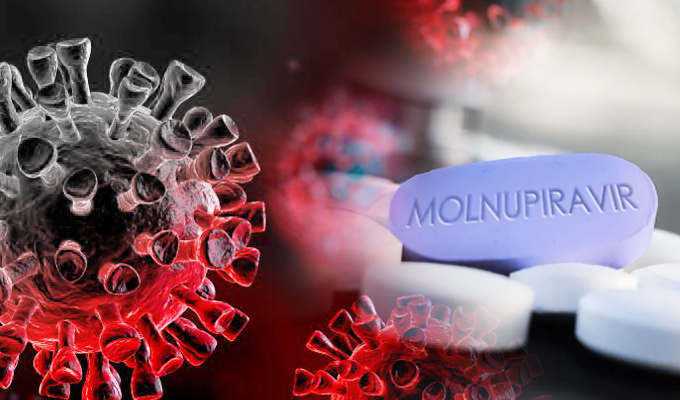Over the last year, several drugs have either been developed or tested to treat coronavirus. Now there’s another new antiviral drug that’s showing some promise by demonstrating ability to stop SARS-CoV-2 transmission within 24 hour!
Molnupiravir an antiviral investigational drug administered orally is currently undergoing clinical trials.
Molnupiravir a ribonucleoside analog was first developed as preventative medicine in early 2000s has shown to work against many viruses that employ an RNA-dependent RNA polymerase, which SARS-CoV-2 also has. Molnupiravir doesn’t stop the virus from replicating, though; instead, the drug introduces errors into the virus’s RNA that are then replicated until it’s defunct.
In July 2020, Florida-based Ridgeback Biotherapeutics and US drug maker Merck & Co Inc. announced their partnership to advance development of Molnupiravir in Covid-19.
Merck is considering studying Molnupiravir as a preventive treatment, to be deployed after a person is exposed but before they’ve fallen ill. That would allow the drug to be deployed even more broadly in the fight against Covid. Should Merck succeed in demonstrating that Molnupiravir is effective and free of serious side effects, it could be a boon to the society, for many years to come.
During an animal study on ferrets, they tried to get coronavirus to spread, and it wouldn’t. So, while it’s a treatment designed to prevent hospitalizations and deaths; it also seems to prevent transmission.
With resources big enough for a trial, Merck launched Phase II/III trials with an aim to enroll almost 3,000 patients in the U.S., Colombia, Israel, Russia, and elsewhere. The company is checking constantly about the pace of recruitment of the study trial and hopes in sending safety efficacy data to the FDA to get emergency use authorization or even full authorization in record time.
ADVANTAGES
| It has been designed as an oral, unlike other treatments right now that are IVs which indicates it as a potential drug that could come before hospitalization and perhaps even prevent severe symptoms. |
| The drug can also be used for people who do not want to get a vaccine or don’t have the resources to get shots. |
| The drug is only used in the short term, twice-daily for five days. |
| It has shown promise against several RNA viruses, not just SARS-CoV-2, which would mean it could help governments prepare for the next pandemic. |
In India, decision to conduct human clinical trials with a new promising antiviral drug, Molnupiravir that is said to block covid transmission will be taken by the strategic group of scientist from Council of Scientific and Industrial Research (CSIR).
Dr. Shekhar Mande, Director General Council of Scientific and Industrial Research has suggested that “Like many other anti-flu drugs, Molnupiravir would also undergo clinical trials for testing in humans and they will apply to the drug regulator for approval.”
A previous study from India has also shown that whereas the SARS-CoV-2 virus can become resistant to Remdesivir, an injectable drug which showed promise in treating moderate Covid-19 disease, Molnupiravir may prove more effective in preventing drug resistance and emerge as a latest gamechanger for Covid-19 treatment.
“Even as the world cheers the progress being made on several vaccines to protect against the Covid-19 pandemic, there is great excitement now on Molnupiravir, a new anti-viral drug which according to latest research completely suppresses virus transmission within 24 hours.”
According to Mr. Yusuf Hamied Chairman of Cipla Limited, Merck has come to India and given all the generics companies an open license to produce this drug. Cipla is planning to do so and get approval in India.
Reference:
While fears around a complete shutdown of the Strait of Hormuz primarily raise concerns around oil prices and energy security, recent history shows that even partial disruptions or security threats along key sea routes can quickly spill over into freight inflation, longer transit times and working capital stress for exporters and importers.
The European Union (EU) has agreed to offer Indian pharmaceutical and medical devices companies preferential access to EU market, along with cutting tariffs on 97.5 percent of chemical products to zero.
As we approach the close of this year, we at ExSyn would like to extend our heartfelt gratitude for your trust, collaboration, and continued support. Your confidence in our products and services has been the driving force behind our growth and success.
The U.S. Food and Drug Administration (FDA) today announced significant action to make it faster and less costly to develop biosimilar medicines, which are lower-cost “generic” alternatives to biologic drugs that treat serious and chronic diseases.
Products containing titanium dioxide in the EU are no longer required to carry warnings about cancer risk, after the European Chemicals Agency (Echa) revoked its classification as a suspected carcinogen. The move follows a June 2025 decision by the Court of Justice of the European Union and means that safety data sheets, labelling and packaging requirements for titanium dioxide have been relaxed across industries including paints, pharmaceuticals, cosmetics and food.
The economic impact of biosimilars on the Australian health care system is now clearer, with data revealing their role in reducing market expenditure and driving price competition.
The Chinese Golden Week impacts Ocean Freight Shippers for two main reasons:
Donald Trump’s tariffs of 50% have come into force on most US imports from India. India’s giant generic pharmaceuticals sector and its electronics and petroleum products are exempt from the tariffs. Aluminium, steel and copper remain at 25%, but job-heavy sectors such as textiles, jewellery, seafood and leather are squarely in the line of fire.
The European Chemicals Agency (ECHA) has published the updated proposal to restrict per- and polyfluoroalkyl substances (PFAS) under the EU’s chemicals regulation, REACH. The update has been prepared by the authorities from Denmark, Germany, the Netherlands, Norway and Sweden, who submitted the initial proposal in January 2023.
